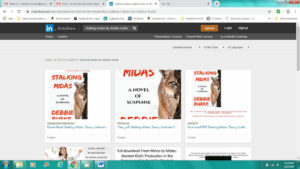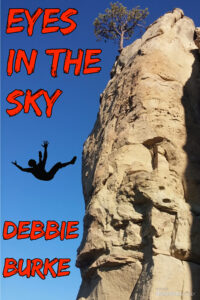By Debbie Burke
A hot topic recently caught fire at the Author’s Guild discussion site: the embarrassing connection between social media giant LinkedIn and book piracy.
LinkedIn owns Slideshare, a knowledge-sharing site. Slideshare is also a popular venue for free downloads of books without the permission of the authors.
In other words, book piracy.
In September, 2019, Margaret Atwood’s highly-anticipated sequel, The Testaments, appeared on Slideshare for free, covered in this article.
Thousands of other books, from famous to obscure, show up on Slideshare without the author’s permission or approval, including my own thriller, Stalking Midas.
How, you ask, do pirates make money from free book downloads?
They don’t…directly.
If you click on those teasers, you’ll likely wind up at phishing sites that contain malware and viruses. Their purpose is to mine credit card data and personal information. You might get free books but lose your identity or worse.
The Digital Millennial Copyright Act (DMCA) made such copyright violations illegal. Authors can demand illicit copies of their work be taken down. The procedure to file complaints is described here.
But pirates aren’t exactly quaking in fear of punishment for their theft.
The fastest way for authors to find if their books are listed is to search Slideshare.net, using book title and author name.
LinkedIn, of course, is facing criticism for their tacit enabling of the crime. Here is their policy, which includes a complaint form to report copyright violations.
Although the form asks for the copyright number, that number is not necessary to register a complaint.
The form also requests URLs of the offending sites. Some books appear in hundreds of places. Tracking them all down further burdens authors, taking precious time away from writing to search for pirates.
Authors Guild members report mixed results after filing complaints with Slideshare. Some say the illicit links have been removed within a short time; others claim that, despite repeated complaints and takedown requests, the links remain up for months; still others report the links are removed but new ones pop up again.
Many authors believe LinkedIn–owned by tech giant Microsoft–should be sophisticated enough to flag repeat offenders and block pirate sites.
Romy Wyllie, author of several architecture books, was shocked to find those books as well as her memoir, Loving Andrew – A Fifty-Two-Year Story of Down Syndrome, on Slideshare. “I never thought of LinkedIn except as a professional social media site. I am considering cancelling my membership in LinkedIn.”
Author Chris Dickon was dismayed to find four of his books on Slideshare. “I can deal with the problem as prescribed, though others have reported it to be a game of whack a mole, but my real question was – Linked In?? which purports to exist to help us all to develop and realize our professional and creative goals, economic progress, etc. but is corporately involved in the theft of our creative product and income, Linked In!?!”
Chris didn’t simply fill out the standard complaint form—he went straight to the top and contacted the CEO and co-CEO of LinkedIn. That resulted in a long phone conversation between LI representatives and Chris: “Linked In…presents itself as a friend and supporter of our professional well being, its very raison d’etre, [but is] involved in stealing from us.”
LI personnel indicated to him that, although they were aware of the problem, they didn’t realize the level of outrage it is causing among authors.
It really should come as no surprise to LinkedIn that authors are angry our work is being stolen via a supposedly legitimate platform.
LI followed up with Chris and invited him to stay in touch. At this point, he is satisfied with their handling of his complaint.
Other authors are publicizing the problem through social media.
William H. Reid, MD, MPH, tweeted: “SHAME on LinkedIn & subsidiary for letting book pirate scum distribute many of my books and thousands of others with no royalties to authors or publishers. Thanks for buying A Dark Night in Aurora from Amazon, B&N, & local bookstores! #LinkedIn #authorsguild”
Mary Rasenberger, Executive Director of the Authors Guild, is in discussions with Microsoft and urges all affected authors to file complaints to put LI on notice.
At this point, LinkedIn is hiding behind the safe harbor provision in DMCA, a loophole that protects online service providers (OSP). There are “two ways in which an OSP can be put on notice of infringing material on its system: 1) notice from the copyright owner, known as notice and take down, and 2) the existence of ‘red flags.'”
If an OSP ignores repeat offenders, they can lose their safe harbor status. Many aggrieved authors believe LI no longer deserves that protection.
Five days after filing my complaint and takedown notice with LI, I received an auto-reply of their action. Stalking Midas has been removed…for now.
As an aside, LinkedIn proudly touts their executive who holds the position of Head of Mindfulness and Compassion. The question is: when will LI become mindful of widespread, blatant copyright violation and show compassion toward authors who are being victimized?
When supposedly legitimate corporations like LinkedIn and Microsoft enable theft, all authors suffer.
~~~~
TKZers: Do your books show up on Slideshare? If so, what action did you take? What were the results?
~~~~
Debbie Burke will be watching to see if her new thriller, Eyes in the Sky, shows up on pirate sites. Publication date January 23, 2020, now available for pre-order here.






Thank you!
Another outraged ripped off writer.
Join the club, Merle! You’re in good company.
I found 2 of mine on the site. One’s perma-free, so I’m not losing sleep over that. Actually, I gave up losing sleep over pirate sites long ago. They just pop up again and are usually outside the US so our laws don’t apply. People who pirate books don’t usually buy them. I did file a notice for the other book of mine I found there. It is upsetting to know this is tied to LinkedIn, though.
I used to pay for Blasty to do all this sort of stuff. Trying to keep on top of pirates takes away precious writing time.
You’re right, Terry, that most pirates are outside the US. That’s why it’s all the more important for LinkedIn to police themselves. They need to block the thieves upfront rather than put the onus on us writers to track down the horses after LI left the barn door wide open.
I found all of mine at Slideshare. Thanks for pointing this out. I wonder how much money these people could make if they put half their time and energy in legal enterprises.
Patricia, it’s sad, isn’t it? Plus we honest folks waste lots of time trying to protect ourselves from scofflaws.
Wow! Didn’t see mine, but then, didn’t really expect to. Thinking about canceling my membership…
Deb, I’m not a member of LI but, if I were, I’d cancel. Shrinking subscriptions might make them pay attention, as happened with FB after the Cambridge Analytica scandal: https://www.marketwatch.com/story/why-did-facebook-lose-an-estimated-15-million-users-in-the-past-two-years-2019-03-07
Thanks for bringing this to our attention, Debbie. I found two of mine on the site. Filled out the complaint form. Now, we wait…
I’ve lost count of how many sites offer my books for free. I would have to work full-time sending out copyright infringement notices to keep up with it. It’s disheartening to say the least.
Sue, what’s distressing is Microsoft/LI has the capability to recognize and/or block pirate sites. Yet they expect us, as victims, to track the criminals who stole from us. Grrrr.
I looked for mine, but got bored and bailed. Will the be litigated? I hope so. It’s hard enough to get reviews, let alone sales without a publisher, and then you have these A**@ Ho*e$!
Owen, litigation is unlikely since most pirates are outside the US. All we can do is spread the word to put pressure on LI to act.
Seems it would make sense for the site to have to have a release from the author before they could post. These kinds of things always have the burden of proof on the wrong side.
Dana, thanks for making an excellent point–the burden of proof is on the victim. Wrong.
Hi Debbie, thanks for this post and the link. My book is on that list. Grrr.
Maureen, they responded fairly quickly to my complaint. Hope you have similar luck.
Thanks for this post, Debbie. I found several postings for two of my books. I reported the copyright infringement in aggregate.
I have Google alerts set up for my older book titles (don’t do this any more) & get emails on sites that post my books. Many are piracy giveaways. I’ve never attempted to hunt violators down. Too much of a time suck, but I did file a report today.
LinkedIn – hard to believe they condone this.
You’re welcome, Jordan. Pirate sites are nothing new. But for a supposedly legitimate platform to condone this theft is wrong.
I was on the front lines fighting ebook piracy for almost twenty years so, yeah, I’m not stunned by this. My favorite corporate reaction was eBay. People would put up vast book collections on CDs and claimed they owned the copyright so it was legal. Who knew that Nora Roberts, Stephen King, and JK Rowling were the same person, and they would give the rights of all their books to you? Anyway, members of an antipiracy collective I belong to took turns buying these CDs and sharing the author lists with members and other authors. When the authors complained to eBay, it promptly took action by BANNING THE AUTHORS WHO MADE COMPLAINTS. The CDs remained for sale and flourished. I shared all this info with JKR’s lawyer so I hope something was done, but I never learned what happened.
If anyone is interested in joining the collective, it’s a listserv on Yahoogroups. We exchange emails about pirate sites, share takedown info, etc. It’s pretty dang quiet, these days, because most of the authors use a takedown service, but new active sites are still mentioned.
To join, send an email to authorsagainste-booktheft-subscribe@yahoogroups.com and mention my name, Marilynn Byerly.
Marilynn, thanks for this additional information. Ebay unfortunately is also well known for shady dealings.
Thanks for alerting us to this, Debbie. I found my book on SlideShare and filled out the form to have it taken off. It’s interesting that your post comes just after the one about “Cheating” written by JSB.
As a former software developer, I fume at the “everybody-does-it” attitude many people have about pirating software. Cheating is cheating, and SlideShare makes it even more personal and frustrating to me since LinkedIn is owned by Microsoft. I wonder if Microsoft would be so nonchalant if it was their software that was being pirated.
Dishonesty is on the minds of many people these days, Kay. Yes, if Microsoft’s ox was getting gored like us, it would be a different reaction altogether.
Debbie, this post is a public service. I found 8 of my books on this site, including my new one! I’ve contacted my agent, ASAP.
Good idea, Elaine, to get agents and publishers involved. The more pressure on LI, the better.
I literally just posted a story with a similar vibe here but with a happier ending…
https://authorsxp.com/author-how-to-articles/639-has-your-book-been-stolen
but I will look into slideshare!
Amy, thanks for the link. Your screen shots tell a whole ‘nother angle–how pirates set up phony discussions to convince browsers they are legit. Just enter your credit card # and get something free from these really good guys. Yeah, right.
Oh and those links on slideshare are mostly the things I talk about in my article — I have a bunch of Pineapple Lies on there but they are all to sites mostly pretending to have our books to get our info/cc numbers.
P.S. My new novel Eyes in the Sky hasn’t been released yet but here’s a pirate on Twitter offering downloads: https://twitter.com/i/events/1217217506668093443
Twitter sent a notice they’d removed the link. Nice quick response.
I got on this early and got nothing but flack from LinkedIn. I’ve heard from a friend that they have gotten a bit more responsive.
Good Hunting Everyone! Terri
Sorry LI wasn’t responsive to you, Terri. Maybe pressure from Authors Guild and lots of authors will make them straighten up.
Rats, I’m a little late to the party today but the most telling line of this entire post is:
“they didn’t realize the level of outrage it is causing among authors.”
Meaning, the criminal act of theft doesn’t bother them at all unless enough people get outraged.
Wow. Talk about unprincipled beings.
“Everybody does it so what’s the big deal?” is the prevailing attitude among too many businesses and people, BK.
Morality and principles are quaint old-fashioned notions, I fear.
Wow. All of my books show up multiple times. What is wrong with people?!
Thank you for educating us about this, Debbie. I get overwhelmed with Google alerts about free links to my books. I used to try to track them down, and alerted the publishers, but I don’t know that anyone does anything about them. PDFs of pirated books multiply like Star Trek tribbles. : (
You’re welcome, Laura. Tribbles and moles to be whacked.
I found many of my books on the site. I filled in the DMCA takedown form on their site and the books were removed. But obviously I need to keep checking it. It’s really upsetting that people don”t respect the work of authors – it’s blatant stealing of which these thieves are proud of. It’s not like there isn’t plenty of cheap and free ebooks on Amazon and other places to legally download. With a day job as well as writing, which has always been a second job for me, I’m fast considering, after all these years, of simply quitting, it’s gotten that bad.
Ang, there’s a trending belief that books/knowledge should be free, spearheaded by students protesting the high cost of textbooks. They feel justified b/c they want it and they want it now, not caring about the hours/years of work that goes into producing books.
Several years ago, my priorities shifted. Now I write b/c I love it and/or I want to relay information. If I make money, that’s nice, but more important is the connection with readers, esp here at TKZ. If you love writing, I hope you don’t quit, Ang.
(a) I hate ebooks. For this reason, and because I can’t enjoy an ebook (personal, I understand).
(b) I deleted my mostly-annoying LinkedIn account a couple years ago. Haven’t regretted that, since my Twitter account began to blossom, especially.
(c) The whole publishing industry and copyright law flustercluck really irritates me.
(d) My computer is out of the running. I often wonder why I bother.
… sigh…
Good luck, everyone. <3
R.L., we write b/c we have to. I try to concentrate most on areas I have control over (like how many words I produce). Constant whack-a-mole can make a writer go crazy.